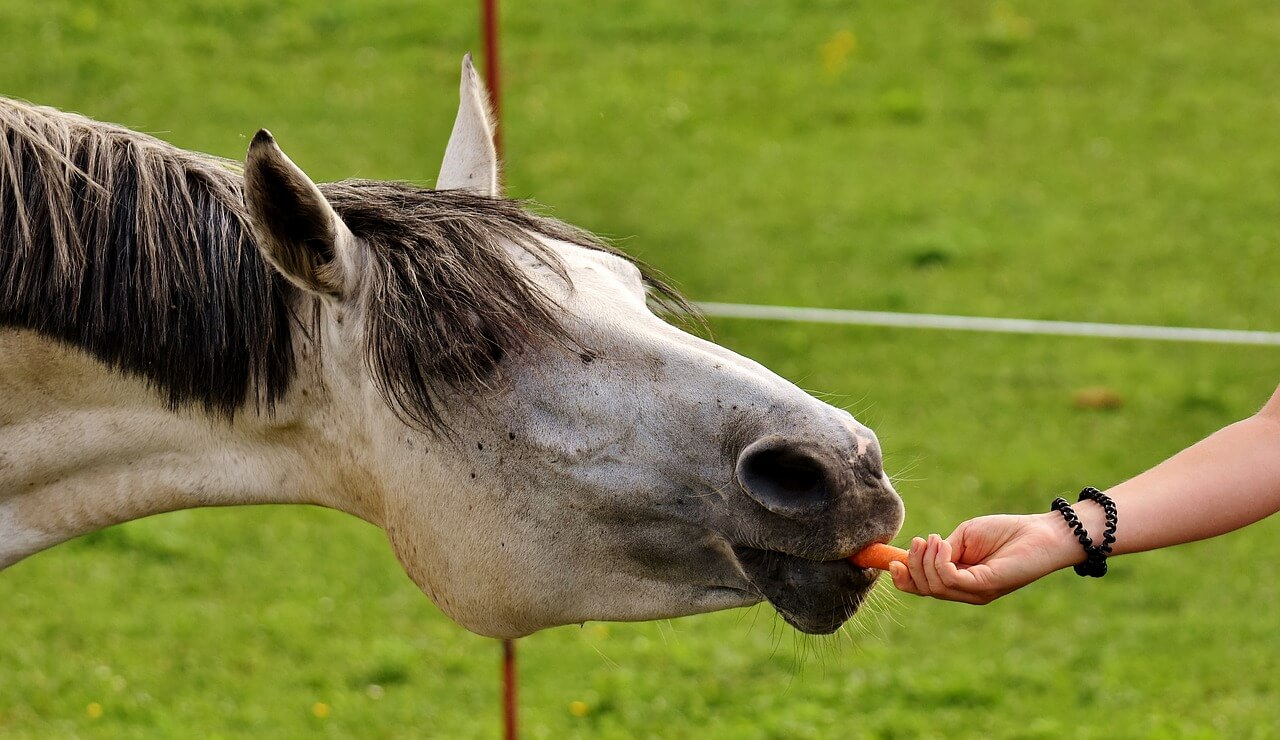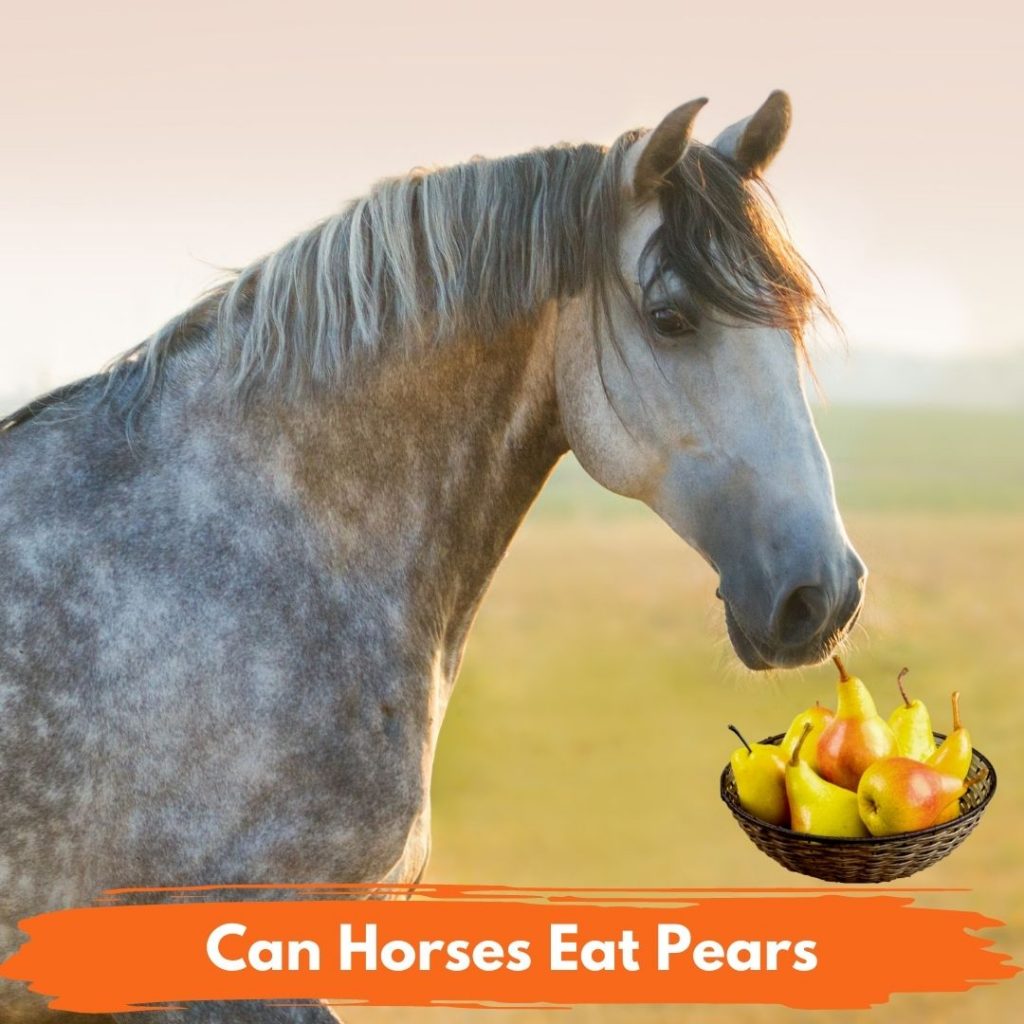Yes, horses can safely eat pears in moderation as a treat due to their high sugar content. Horses are herbivores that primarily consume grass and hay, but they can also enjoy a variety of fruits as occasional treats.
Pears are one of the fruits that horses can eat. However, it’s important to note that pears contain a higher sugar content compared to some other fruits, so they should be given in moderation. Feeding excessive amounts of pears to horses can lead to digestive issues or weight gain.
As with any new food introduced to a horse’s diet, it’s best to start with a small amount and monitor their reaction. Providing a balanced and varied diet is crucial for maintaining a horse’s overall health and well-being.

Credit: equestrianco.com
Pears And Equine Diets
Horses have specific nutritional needs, and it’s important to understand their digestive system when it comes to introducing new foods into their diets. Pears are a popular fruit, and many horse owners wonder if it’s safe for their equine companions to consume them.
The equine digestive system is designed to efficiently process a diet high in fibrous forages such as grass and hay. Horses have a unique hindgut fermentation process that allows them to break down fiber and extract nutrients from it.
While pears are generally safe for horses, they should be fed in moderation. These fruits are high in sugar and can cause an imbalance in the equine diet if overconsumed. It’s crucial to offer pears as a treat or supplement to a well-balanced equine diet, ensuring they are chopped or diced into smaller pieces to prevent choking hazards.
In addition to pears, it’s important to focus on meeting the overall nutritional needs of horses. A diet consisting of high-quality forage, balanced with essential vitamins and minerals, is crucial for maintaining the health and well-being of horses.
Nutritional Value Of Pears For Horses
Pears are a nutritious treat that can be safely incorporated into a horse’s diet. They are composed
of approximately 84% water, making them a hydrating choice for equines. Additionally, pears are rich
in essential nutrients such as vitamin C, fiber, and antioxidants. These
nutrients contribute to various benefits when included in a horse’s diet.
| Component | Percentage |
|---|---|
| Water | 84% |
| Fiber | 3.1% |
| Sugar | 10% |
| Protein | 0.5% |
| Fat | 0.3% |
| Vitamin C | 5.5 mg/100g |
Pears are a good source of vitamin C, an antioxidant that supports the horse’s immune system,
as well as fiber which aids in digestion and promotes healthy gut function. They also contain
potassium, copper, and vitamin K, which are important for overall health.
Including pears in a horse’s diet can offer several benefits. The high water content helps with hydration,
particularly during hot weather or intense workouts. The fiber present in pears aids in maintaining
a healthy digestive system and can help prevent issues such as colic or constipation. Furthermore, the
antioxidants found in pears contribute to the horse’s overall well-being. However, it’s important
to remember that pears should be given in moderation as part of a balanced diet, as excessive consumption
may lead to digestive upset or weight gain.
Potential Risks And Concerns
When considering feeding pears to horses, it is important to be aware of potential risks and concerns. One issue to be wary of is possible digestive problems. Horses have sensitive digestive systems, so introducing new foods can sometimes cause discomfort or even colic. Additionally, horses can have allergic reactions to certain fruits, including pears. It is recommended to monitor the horse closely after introducing pears to their diet to ensure they do not develop any adverse reactions.
Moderation and portion control are key when incorporating pears into a horse’s diet. While pears are generally safe for horses to eat, it is important to remember that they should be fed as a treat, rather than a staple in their diet. Excessive consumption of pears or any other fruit can lead to weight gain, as fruits are high in natural sugars. To avoid unnecessary health issues, it is best to limit the amount of pears given to horses and offer them in small, controlled portions.
Best Practices For Feeding Pears To Horses
Feeding pears to horses can be a healthy and enjoyable treat for them. It is important, however, to follow some best practices to ensure their safety and health. Preparing pears for horses is simple – wash them thoroughly, remove the core and seeds, and cut them into small, bite-sized pieces. When it comes to serving sizes, it is recommended to start with small amounts and gradually increase to avoid any digestive issues. Pears can be fed as a standalone treat or combined with other foods to provide balanced nutrition. Remember to keep a close eye on your horse’s response to pears and adjust the serving sizes accordingly. It is also important to note that pears should not be the sole focus of their diet and should be given as an occasional treat in moderation.
Alternative Fruits For Horses
When it comes to equine diets, it’s important to ensure a balanced intake of nutrients. While hay and grass form the foundation of a horse’s diet, incorporating some fruits can provide variety and additional nutritional benefits. When choosing alternative fruits, consider the nutritional profile and how it complements the horse’s dietary needs.
| Fruit | Protein (g) | Fat (g) | Fiber (g) | Sugar (g) | Calcium (mg) | Phosphorus (mg) |
|---|---|---|---|---|---|---|
| Pear | 0.4 | 0.1 | 3.1 | 9.8 | 8 | 10 |
| Apple | 0.3 | 0.4 | 2.4 | 10.3 | 6 | 11 |
| Watermelon | 0.6 | 0.2 | 0.6 | 6.2 | 5 | 11 |
Among the recommended fruits for equine diets, pears are a popular choice due to their nutritional composition. With a moderate fiber content, pears can aid in digestion while providing natural sugars for energy. They also contain small amounts of calcium and phosphorus, contributing to bone health. Apples, another commonly fed fruit, have similar nutritional profiles but slightly higher sugar content. Watermelons, on the other hand, provide a refreshing choice with lower sugar content and additional hydration benefits.
Incorporating a variety of fruits can add diversity to a horse’s diet and help prevent boredom. Remember to introduce new fruits gradually and monitor the horse’s response. Each horse is unique, and it’s essential to consult with a veterinarian or equine nutritionist to determine the appropriate inclusion of fruits in their diet.
Frequently Asked Questions For Can Horses Eat Pears
Can Horses Eat Pears?
Yes, horses can eat pears in moderation. Pears are a tasty treat for horses, but they should be given in small quantities to avoid digestive issues. Remove the seeds and core before feeding as they can be a choking hazard.
Always introduce new foods slowly and monitor your horse’s reaction.
Are Pears Safe For Horses?
Yes, pears are generally safe for horses to eat. However, it’s important to remember that horses have sensitive digestive systems. Feeding large quantities of pears can cause digestive upset such as colic or diarrhea. It’s best to offer pears as an occasional treat and monitor your horse’s health and appetite.
What Are The Benefits Of Feeding Pears To Horses?
Feeding pears to horses can provide various benefits. Pears are a good source of vitamins and minerals, including vitamin C and dietary fiber. They can also be helpful in hydrating horses due to their high water content. However, it’s important to balance their diet with other nutritious foods to ensure overall health.
Conclusion
Pears can be a tasty and healthy treat for horses. However, it is important to feed them in moderation and remove the seeds to avoid any potential digestive issues. While horses have different preferences and tolerances, introducing new foods gradually is always the best approach.
So go ahead and offer your equine friend some pears, but remember to consult with a veterinarian for personalized advice.

